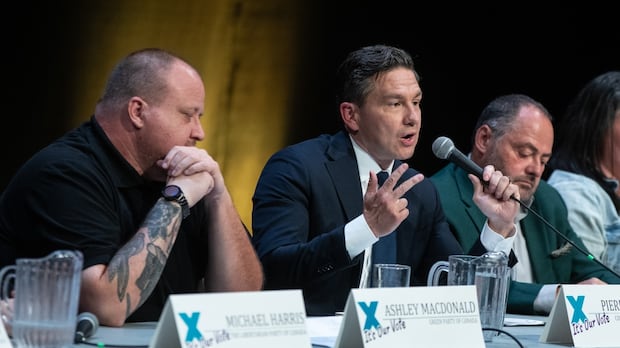Is the tradition of giving party leaders a free pass to the House dead?
Political parties won't be giving Conservative Leader Pierre Poilievre a free ride back into the House of Commons — seemingly ignoring a parliamentary tradition that dates back decades.
But the convention of political parties standing aside to allow seatless party leaders an easy path to the House — known as "leadership courtesy" — hasn't been consistently applied.
Former Alberta MP Damien Kurek vacated his seat in Battle River-Crowfoot to give Poilievre a chance to rejoin the House of Commons after the Conservative leader lost his longtime Carleton riding in April's general election.
Although a large majority of the more than 200 names registered for the Aug. 18 byelection are associated with a group of electoral reform advocates, the Liberals, NDP, Greens and a number of smaller parties are all running candidates against Poilievre.

Lori Turnbull, a political science professor at Dalhousie University, said she isn't surprised.
"I didn't expect the leader's courtesy to apply here at all," she told CBC News.
There are several examples from the last century of parties not contesting a byelection where a party leader is seeking to gain a seat.
One of the earliest cases took place in 1919, when recently elected Liberal Leader William Lyon Mackenzie King was the acclaimed candidate in a byelection in Prince Edward Island.

King offered the leadership courtesy to Progressive Conservative Leader Robert Manion in 1938. King would also benefit from the PCs not putting up a candidate against him in byelections in 1926 and 1945 — though he had to run against Independent candidates both times.
The Liberals also stood down for other PC leaders: George Drew in 1948, Robert Stanfield in 1967 and Joe Clark in 2000. The PCs didn't run a candidate against then Liberal leader Jean Chrétien in 1990. And the Liberals and PCs opted out of byelections that saw former Canadian Alliance leaders Stockwell Day and Stephen Harper gain seats in 2000 and 2002 respectively.

"It's not like a hard and fast rule. But when it applies, it's typically when the leader is elected and they're not an MP yet," Turnbull said.
"[Poilievre] was an MP and then he lost. So it doesn't strike me that this would be a place where, necessarily, that courtesy would apply."
Potentially the most comparable case to Poilievre's is King, who twice had to seek a seat after losing in a general election. But in King's case, his Liberal Party won the most seats both times — and King was running in byelections as prime minister, not the leader of an opposition party.

Green Party Leader Elizabeth May, who has been a vocal supporter of the tradition in the past, agreed that Poilievre's situation wouldn't warrant an automatic application of leadership courtesy.
"We've been respectful of the tradition, although it's not an obligation," she told CBC News.
"It couldn't be more unusual as a set of circumstances — and in this context, a leader's courtesy agreement doesn't spring to mind from any perspective."
Even when it comes to newly elected leaders, leadership courtesy hasn't always been consistently applied — or applied equally to all parties.
The Liberals ran a candidate against Brian Mulroney in a 1983 byelection shortly after he became leader of the Progressive Conservatives.
The NDP has almost always opted to run candidates against newly elected leaders — Stanfield in 1967 being the lone exception — and New Democrat leaders haven't seemed to be granted the courtesy either.

In 2019, when Jagmeet Singh was seeking to gain a seat in a B.C. byelection, only the Greens stood down their candidate. The party's first leader, Tommy Douglas, also had to run against Liberal and PC candidates in byelections after failing to secure a seat in both the 1962 and 1968 general elections.
May criticized the NDP for running a candidate against former leader Annamie Paul in 2020. But she said Poilievre's situation is different for a few reasons.
Beyond Poilievre not being a recently elected leader, he is running in what is considered to be one of the safest Conservative seats in the country.
"I don't think it would make a material difference to the outcome if we had withdrawn our candidate," May said. But she said the Greens would've considered pulling their candidate had the Conservatives asked them to do so.

Turnbull said it is also generally expected that parties run a candidate when they can. She pointed to former Liberal leader Stéphane Dion facing backlash from some of his party's members for not running a candidate in a Nova Scotia riding as part of an agreement with May during the 2008 election.
"People expect the party to contest it. It would not be easy for a political party to explain to its supporters that we're not going to run this one," she said.
Even when leadership courtesy has been offered, they can still expect to face Independent candidates. Beyond the 200 or so electoral reform candidates, Sarah Spanier and Bonnie Critchley are putting themselves forward as non-partisan options to Poilievre in Battle River-Crowfoot.
Both Turnbull and May suggested the parliamentary tradition might be slowly on its way out of fashion, mostly due to the hyperpartisan nature of the current political climate.
"I think a lot of our parliamentary traditions are increasingly seen as covered in cobwebs — particularly the traditions that speak to setting partisanship aside in a tradition of respectful engagement in Parliament," May said.
"If people see this as a blood sport — and they do … it just seems to me like as a whole we've moved more towards that competitive edge than any sort of courtesy between the parties," Turnbull said, adding that the leadership courtesy tradition "might be dead."
cbc.ca




